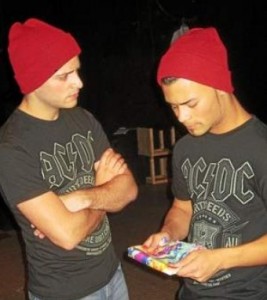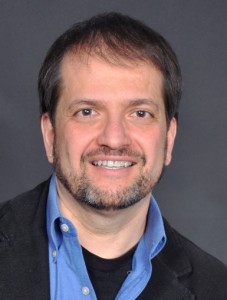Social Worker’s Play Looks at Bullying from the Viewpoint of the Bully

Luis Pagan-Anderson and Marcus Matos played the older and younger, respectively, versions of Jo-Jo, the bully in Getting COMPLETE! Photo courtesy of Berks-Mont News.
National Association of Social Workers member Santo D, Marabella, DSW, MBA, is an educator and playwright.
His new play “Getting COMPLETE!” takes the unusual slant of looking at the issue of bullying from the perspective of the bully, not the victim.
In the play Jo-Jo, who has bullied his classmates for years, grows to adulthood, regrets his youthful actions, and tries to make amends. Will his classmates accept his apologies and embrace the new Jo?
Marabella sat down with SocialWorkersSpeak.org to talk about why he decided to write the play, where it is being performed, and how social workers can get to see it.
Q: Hello Santo. Tell us why did you decided to become a social worker and what is your current job?
Marabella: When I was an undergraduate student, I was very committed to community organizing and volunteer programs. I had no idea what my major should be and a close friend and mentor suggested that I take a degree in business management. It made a lot of sense because organizations, whether for profit or not-for-profit, still have to run like businesses. By the time I got the graduate school for my master of business administration (MBA), I realized that I still had a commitment to community organizations but needed some professional education in that area. So I decided to pursue my doctorate in social work at the University of Pennsylvania (Penn), in an administrative track. During my years at Penn, I would teach a course at various colleges at night to help pay for my education. Initially, I thought it was just something to make money, but it quickly became very clear that I really enjoyed and was passionate about teaching management. I am a professor of management at Moravian College in Bethlehem, Pa., where I directed our MBA program for seven years and chaired our department for three years. Every day, whether I am teaching, consulting, or writing, I am a social worker. My perspective and approach to planning, community building and problem-solving are grounded in the social work values that were instilled in me a child and developed in me as a graduate student.
Q: When did you become interested in theater and being a playwright?
Marabella: I have always been involved in theater at some level. Whether it was singing long to the “Jesus Christ Superstar” album with childhood friends, or accompanying my dad to rehearsals when he played in and led orchestras for local theater productions. Theater was a wonderful outlet for my creativity. I never had much talent on the stage, but was always drawn to playwriting because of the way it tells stories through musicals and plays. I have written plays, screenplays and a musical, some of which have been produced.
The only way to write this story was to be open to learning and understanding bullies. My No. 1 challenge was getting into the mind of a bully, and I went there kicking and screaming. – Santo Marabella
Q: How did the play “Getting COMPLETE!” come about?
Getting COMPLETE!” was a story I avoided telling for some time. I was bullied as a youth — my first 10 years of school. It was a story I needed to write but was afraid to write. Then, when I chaired our school’s Alumni Council at Penn, we created a conference on bullying called “Bullying Across the Lifespan,” and I once again became present to the issue, but continued to avoid it. I had thought about this as a project, but allowed other projects to take precedent, probably because I wasn’t ready to take on the mental and emotional investment that I knew this project would require.But, that avoidance ended last year when Fran Miller Pepoon, an old high school friend who followed my blogging as The Practical Prof, contacted me. She was coming to terms with her own bullying and asked me if I had any interest in writing a book on bullying. I thought about it and let her know that I wasn’t interested in a book, but I would work with her on a play. We agreed that I would write the play alone, and she would provide support to the process and help produce the production.
Q: Most stories about bullying are told from the viewpoint of the person is being bullied? Why did you decide to do the pay from the vantage point of the bully?
Marabella: Making a difference and having a real impact that reduces and eliminates bullying requires that we invest more attention and resources into understanding the bully. This is not an attractive proposition because we empathize with victims of bullying, not the bully. But, to me, this is the only real hope for ending the cycle. And, so, “Getting COMPLETE!” had to be written from the bully’s perspective. I truly wanted it to provoke people to consider the pain of the bully and even empathize with the bully.

Santo Marabella, DSW, MBA.
Q: For a person who was victimized by a bully this process must have been difficult:
Marabella: This perspective did not come easy. The only way to write this story was to be open to learning and understanding bullies. My No. 1 challenge was getting into the mind of a bully, and I went there kicking and screaming. I fought with myself constantly.
Q: What kind of research was involved?
Marabella: Fran Miller Pepoon, who co-executive produced our premiere production, did a lot of the research. Between our own personal experiences, we pretty much had a good understanding of the bully’s victim point of view. Where the research was particularly helpful was in describing the bully’s traits, behaviors and needs. The information she gathered helped me hone my creation of the character and his actions.
Q: Where has “Getting COMPLETE!” been performed? Where are you planning to stage it?
Marabella: “Getting COMPLETE!” had a local premiere in my hometown this past October, thanks to Fran, and our collaborating partners – Kutztown University, Reading Community Players and Fleetwood Community Theatre — along with a fabulous cast and crew of talent individuals. The audience reactions were strong and favorable.The current plan is to submit it to festivals and competitions, that is, after I do some rewriting in the first act. Sometimes it takes seeing the play on stage to know what it needs to tell the story in a more cohesive or entertaining way.
Q: If an NASW chapter wants to sponsor a performance, what do they have to do?
Marabella: I would be delighted to speak with any organization or NASW chapter about presenting a production of the play. Never having taking one of my plays on the road, I’m not exactly sure how this would work, but I know anything can happen when there is commitment among collaborating partners.The play runs about 70 minutes, plus any time for an intermission between the two acts. It is most appropriate for senior high school students, college students and adults due to language and mature themes. If interested email me at santo@MarabellaLLC.com or like our Facebook page.
To learn more about how social workers help young people address bullying read National Association of Social Workers “Help Starts Here” articles on the subject.
| Leave A Comment
Advertisement
1 Comment
Leave a Comment
You must be logged in to post a comment.



It is true that in order to stop bullying, the bully needs help as well.
The dynamics in a situation when someone is bullied involves the one being bullied, the one who bullies and the bystanders. It is necessary to work with all of the ones involved in order to do prevent and remedy bullying.